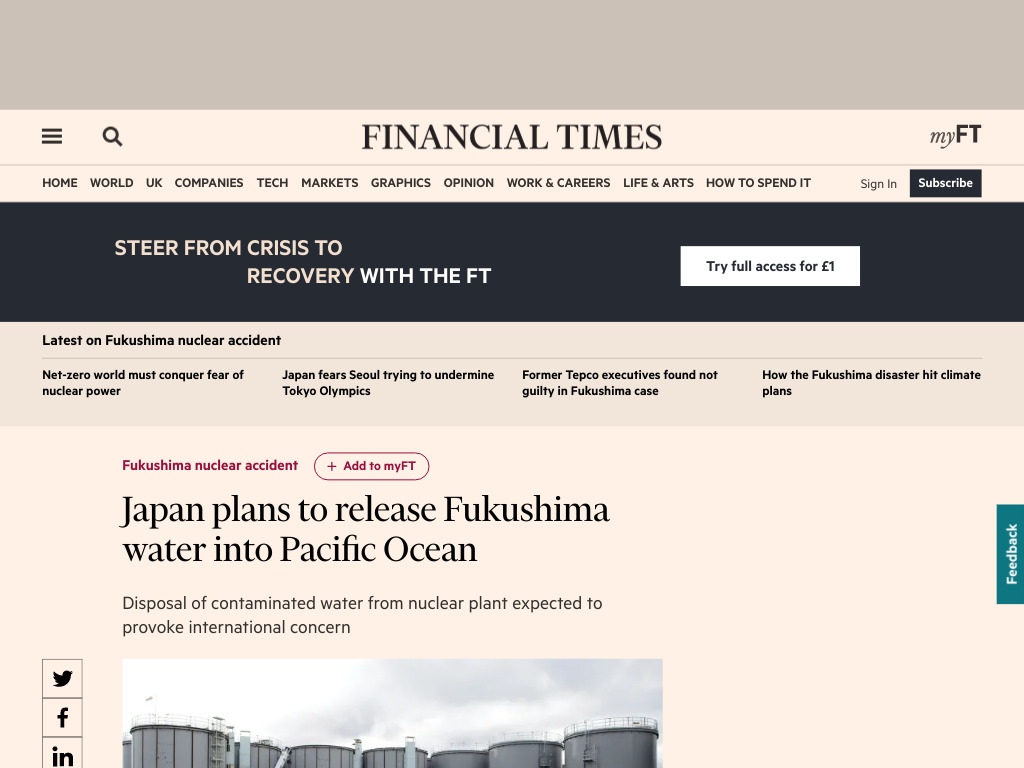Japan is nearing a decision to release more than 1m tonnes of tritium-contaminated water from the stricken Fukushima Daiichi nuclear plant into the Pacific, a move that threatens to provoke domestic and international criticism.
According to local reports and officials briefed on the process, releasing the contaminated water into the ocean is regarded as the only viable option. The government is expected to make a decision within a month.
Dumping contaminated water at sea will bring back some of the trauma of the nuclear accident nearly 10 years ago. But Japan’s government argues that tritium is released routinely by working nuclear reactors around the world, and that there is no risk to human health.
“At present, the government has made no decisions on substance or timing,” said Katsunobu Kato, the chief cabinet secretary. “On the other hand . . . the reality is we can’t delay a decision on the treated water forever.”
Three out of six reactors at the Fukushima Daiichi plant suffered meltdowns in March 2011 when a tsunami knocked out their cooling systems. Thousands of tonnes of water were pumped into the reactors as coolant and groundwater has continued to flow into the damaged structures, becoming contaminated with radioactive nuclides.
Plant operator Tokyo Electric Power, known as Tepco, has stored more than 1m tonnes of this water in tanks at the site but it is running out of space. Officials said that capacity would run out by 2022, and with around two years needed to build equipment to discharge the water, a decision on how to handle it was urgent.
Tepco has processed the water through a filtration plant and said it had removed almost all of the radioactive nuclides. But there is no effective technology to separate tritium, a radioactive isotope of hydrogen, the lightest element.
Scientists advising the Japanese government looked at a range of options to deal with the water, including evaporating it into the atmosphere or injecting it into underground reservoirs. But diluting it and then releasing it into the ocean was judged the safest and most cost-effective approach.
However, releasing the water is vehemently opposed by residents of Fukushima and by Japan’s fishermen, who faced export bans because of the nuclear accident. Fishing in waters near the Fukushima Daiichi plant is still restricted.
JF, an umbrella body for Japan’s fishing co-operatives, told ministers that they were “absolutely against” releasing the water into the ocean.
“We recognise that the handling of this water is a pressing and important national problem, but if this water is released into the ocean, we will suffer inevitable damage to our reputation,” the co-ops declared.
“Our fear is that it will have a severe impact and all the effort of fishermen [to recover from the Fukushima disaster] will go down the drain.”
South Korea has also criticised Tokyo’s plans to release the water. Japan had hoped to use the Tokyo Olympics to promote Fukushima’s recovery from the nuclear disaster, leaving a decision on the water until after the games, but the event was postponed until 2021 because of Covid-19.



As long as they've deionised the water (and it says in the article that they did) it seems reasonable to me. The concentration is already too low to separate at 13 parts per trillion.
They can keep waiting, as Tritium has a half life of 12 years. But then the only difference is in how fast they can release the water when they get around to it. Right now they have to dilute it 700 000 times to match the natural concentration. That's not difficult to do, you just need a pump and a dropper. And it would just be for extra safety, tritium is already very weakly radioactive as it is.
Making sure the water is unionized is praxis.